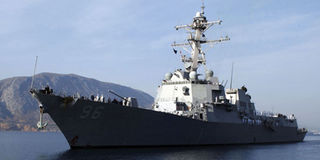Somali pirates not cowed by global solidarity

The US Navy destroyer Bainbridge is seen in Crete, Greece in this handout photo taken October 8, 2007. The Bainbridge arrived before dawn on April 9, 2009 off the Somali coast, where the captain of the Maersk Alabama, a U.S.-flagged freighter, has been taken hostage by pirates, the shipping line said. REUTERS
The botched hijack of a Danish-owned, US-operated cargo ship by Somali pirates on Wednesday makes a mockery of efforts by the US and the European Union which have deployed warships to patrol the troubled waters.
Other countries such as Japan, Pakistan, India, Germany, France, China, Iran and South Korea have dispatched warships to fight piracy off the Somalia coast.
The Wednesday attack marked the first capture of an American seamen by Somali pirates in recent history.
Latest reports by Reuters news agency that the 20 American crew aboard the 17,000-tonne Maersk Alabama freighter re-took control of the vessel after a confrontation with armed pirates, far out in the Indian Ocean.
The bandits have seized another five vessels in the past one week.
The ship which was carrying food aid from the World Food Programme and Catholic charities, was destined for Mombasa when it was attacked 450 kilometres southeast of Eyl, the “capital” of pirates.
The pirates sank their boats after boarding the Alabama but the crew offered them the ship’s lifeboat and some money to leave.
Mr Ken Quinn, a second mate, told CNN that took one of the pirates hostage but his accomplices fled with captain Richard Phillips in the lifeboat.
A second mate is an assistant in merchant ship.
Deputy captain Shane Murphy said they freed the pirate in exchange of Phillips, but the bandits stuck with him demanding fat ransom.
US navy destroyer USS Bainbridge had sailed closer to the lifeboat to rescue Mr Phillips.
Mr Philips is the first American to be held hostage by Somali pirates in recent history, and the move may add a different dimension to sea banditry in the Horn of Africa.
The tricky option
His capture is a major test for US President Barack Obama whose government will be confronted with the tricky option of negotiating ransom with bandits-linked to terror groups or order military action.
Mr Obama’s foreign policy adviser Denis McDonough said his boss was monitoring the situation closely.
“We are just trying to offer them whatever we can, food, but it is not working too good,” Mr Quinn said of efforts to secure their captain’s release.
CNN said the lifeboat, with the captain and three pirates aboard, was within sight of the Alabama.
Apparently, the pirates met their match in the crew. They were unaware that the Americans had trained in anti-piracy tactics at the Massachusetts Maritime Academy.
The academy has been training cadets for two years in these tactics in anticipation of the moment that a US vessel would be boarded by pirates.
Mr Murphy and Mr Philips are graduates of the academy. And guess who was their teacher? Murphy’s father, Joseph, an expert in anti-piracy tactics.
So even as they set out on their journey, they were well prepared for an attack by pirates.
“These waters are infested with pirates that hijack ships daily,” Mr Murphy wrote on his Facebook page recently as he sailed between Oman and Kenya. “I feel like it’s only a matter of time before my number gets called.”
Mr Murphy boarded the Maersk Alabama after delivering a lecture on fighting piracy at the academy three months ago.
At the academy in Bourne, crews are taught how to cordon off pirates by forming convoys under naval escort, steaming at high speed, and stationing crew on deck to make it appear that the vessel is ready to repel boarders.
They are also taught how to disable the ship to thwart pirates.
The academy’s president, Mr Rick Gurnon, reckon that the crew may have disabled the Maersk Alabama.
The attack shows that the patrols by warships have not been an effective deterrent measure in the war on piracy.
The bandits are determined to make money at whatever cost despite the patrols.
The fact that they could muster the guts to capture American crew is particularly telling,
The sea gangs have devised new strategy to circumvent the patrols.
Until about six months ago, pirates operated fairly close to shore; now they operate far off the coast.
Incredibly vast area
“It’s an incredibly vast area, and basically we’re seeing pirates in more than a million-square-mile operating area,” said Ms Jane Campbell, a spokeswoman for the US Navy’s 5th Fleet, based in Bahrain. “So while the presence of naval vessels has had an effect, we continue to say that naval presence alone will never be a total solution. It starts ashore.”
The pirates are keen to capture vessels far away before they are sighted by the warships.
Ms Campbell says it would take 60 naval ships to adequately guard vessels traversing the Gulf of Aden.
Even the slump in attacks since January is not attributable to the patrols; it was due to turbulence of the sea brought by the winter monsoon. More attacks are likely to be staged with the calming of waters this month.
“We think the world must come together to end the scourge of piracy,” US Secretary of State Hillary Clinton told reporters in Washington.
US Senate Foreign Relations Committee Chairman John Kerry said a thorough policy debate on Somali piracy was long overdue.




